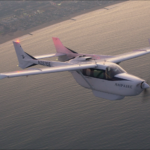The aerospace industry has suffered a massive downturn due to COVID-19, but Henry Brooks of Collins Aerospace says technological changes will create a “bright future”
Collins Aerospace was created in 2018 to create technologically advanced and intelligent solutions to solve customers’ toughest challenges and meet the demands of a rapidly evolving global market.
The company, a unit of Raytheon Technologies Corp, was formed from the merger of UTC Aerospace Systems and Rockwell Collins. Henry Brooks, President of Power and Controls at Collins Aerospace, explained that, in spite of the pandemic, customers were still responding positively to the company’s development initiatives. Revenue synergies had been progressing as expected during the company’s second year, despite the disruption of the pandemic.
“Even with the headwinds on the commercial side of our business due to COVID-19, we’ve identified several hundred revenue opportunities and synergies, ranging from specific near term pursuits to longer term areas of aerospace market needs, the broader areas of focus really turned out to be things like the connected aviation ecosystem itself, which a lot of work is going on with right now,” said Brooks.
Autonomous technologies: part of the “new future”
Brooks added that the market was moving towards the adoption of “a new future” which would feature autonomous technologies. He explained: “Collins Aerospace has technologies that we think can enable that new future, if you will, both on the commercial as well as on the military side of our business. And then also, obviously, we’re working with electric and hybrid electric solutions, as you know, and you’ve heard from Airbus, by 2035, they’re really looking to feel something completely different than we’re flying today.”
The company is working with the rest of the industry to encourage recovery through safe flight initiatives which cover different customer experience points – from walking into the airport to taking their seat on board. He added that commercial domestic flights were coming back but educating passengers and ensuring they felt safe on long haul journeys would aid recovery.
The pandemic may have brought restrictions, disruptions and a whole host of new guidelines aimed at keeping colleagues and the wider public safe, but Brooks is also looking forward to the vast range of technological developments which will be shaping both commercial and military industries in the near future.
Within Europe he said key programmes included the sixth generation fighter and Light Combat helicopter. He said: “We’re looking at sovereignty requirements, we’re making sure that there are no restraints or limitations when it comes to countries and engaging with their Armed Forces, no constraints on addressing the export markets, and agreements and their ability to do modifications and enhancements.”
Hybrid electric engines – the real thing
On the commercial side, Brooks said some of the most exciting developments came in the reduction of emissions. “The standard propulsion engines that we’ve all become accustomed to, and we all fly on, are not the engines of the future,” he said. “So these hybrid electric engines are going to be a real, real thing. In some cases, the UAM that are going on in, this air taxi service between regions and checkpoints within cities, they are a very real thing. And Collins aerospace is working hard to make sure that we have the technologies, if you will, to support those activities.”

